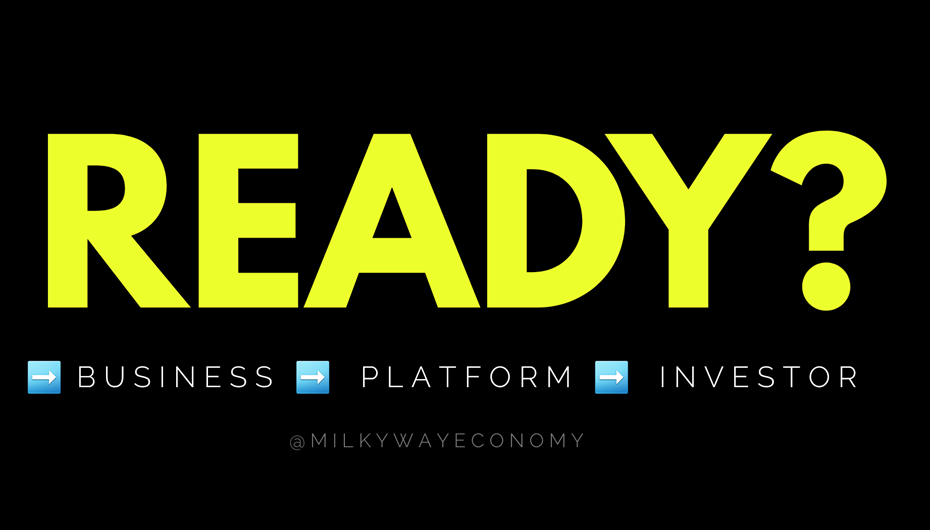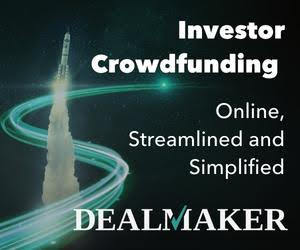The secret to raising money for your business is having money to spend raising money for your business. Thank you for attending my TedTalk on how businesses are using JOBS Act Investment Crowdfunding to raise up to $5M for their business. Note - they’re spending $250k to $500k to do it.
As you get over the shock of the Sticker Price of how much it costs to raise money for your business below are the Three Steps you need to know to understand why it costs money to raise money. In short, you need to be ready.
Step 1 - Getting Your Business, Business Ready
You need to have a BONAFIDE BUSINESS in order to legally raise money for your business. What does this mean if you’ve been in business for a few years or decades? It means you’ve already invested in starting a business and are more than likely 95% Business Ready.
However, if you’re a StartUp, are you business ready? More likely, if you’re thinking about starting a startup (aka, you’re a wannapreneur) is your startup business ready? The answer to that is probably a resounding, “No”. So, how much does it cost to start your business?
Sticker Price of Starting a Business - $5k to $2B
It can cost very little to start a business, say $5K or it can be very expensive. Quibi raised $1.75B to launch its streaming service and went out of business in 6 months. Meanwhile, many people start very successful businesses just by incorporating their name, getting a free TikTok account and starting to sell to customers.
I know this can seem like a chicken-egg situation that you need to raise money to start your business before you can start your business. But the truth is, you can organize, incorporate and launch your business before you develop your first good, product or service. The reason you need to raise money is probably to develop, market and sell your first good, product or service, not actually start your business. You may also need money to register your business’ IP before you formally market your goods, products, or services. But again, that step comes after you start a bona fide business.
Step 2 - Getting Platform Ready
If your business is Business Ready, awesome. Just remember, if your idea isn’t a business it's an idea. You can’t raise money for whatever thought is in your head. You need to turn that idea into an Inc, typically a C-Corp, so you can raise capital for that bonafide corporation/business. Now, assuming your business is ready, then we can talk about what your business needs to do to be Platform Ready.
What is Platform Ready?
Every FINRA licensed investment platform (also called a “funding portal”) has set objective criteria each offering must meet before you can put your offering on their platform. Currently, there are about 70+ funding portals. You can see the list of FINRA licensed platforms here: https://www.finra.org/about/firms-we-regulate/funding-portals-we-regulate. Before you can place your Business’ crowdinvesting offering onto any platform you’ve got to be Platform Ready. Each platform has slightly different requirements:
- Advertising Budget - Some require a $50k advertising budget to advertise your offering.
- Note - platforms can’t legally promote your offering. You have to bring the potential eyeballs of investors to your offering.
- Funding Goal- Others require that you have 20%-30% of your funding goal already committed to investing in your deal before it can go live.
- Platforms love cheering on winners when they’ve already done the hardest part of winning by raising the first $100k - $500k.
- Form C- Twenty-one days before your deal goes live on whatever platform you select you have to submit your FORM C to the SEC. Your FORM C is your company’s resume. Most of the time FORM Cs are completed by lawyers who will charge you about $5K to compile the information. However, you still need all the information to give to the lawyers so they can compile it. Some of that information includes:
- Certified or Audited Financials ($1K to $50K depending on a number of factors)
- Business Plan ($1K to $10K)
- Incorporation documents (Remember you have to show you’ve already spent the money and time to become a bona fide business before you attempt to raise money. That will cost you between $5k and $2B, again depending on what you’re trying to do.)
- Video - Almost forgot about your pitch video. Every pitch needs a pitch video. Videos can be free or $50K +. Depends on how good you are with telling your story with your iPhone or if you need to hire a professional. Funding hack - always hire a professional.
Sticker Price of TRYING to raise $0 to $5M for your bonafide business: $16k to $250k
Investor Ready
Congratulations! Having paid the sunk cost of starting a business ($5k to $2B) and becoming platform ready ($16k to $250k) you can now select your FINRA licensed crowdfunding platform and try, attempt, see, if people want to invest in your business. Hint - even after incurring the sunk cost of ~$65K the answer to “Do people want to invest in my business?” may still be “No”.
Its not you. That’s the secret to entrepreneurship. No one knows if they’re going to be successful until they try to sell whatever their good, product or service is to real customers. Everything before your deal goes live is academic and really doesn’t count. Well, it counts in the sense that it may very well cost you your life savings to learn no one wants to invest in your business. But it doesn’t count because you’ll never know if you can scale your business via investors until you wager your blood, sweat, tears, emotional and mental health to see. Did I mention entrepreneurship is so hard that I only recommend entrepreneurship to my enemies?
Is your business Investor Ready? Only the potential investors can tell you that. And only believe the ones who speak with their dollars. Everyone else is lying to you.
Which Platform Works Best for BIPOC Founders?
This is a bonus section because I loath the term BIPOC. It's such a lazy acronym: Black, Indigenous, People of Color. But I digress and will write another article about that. The short answer is “none”, because legally they can’t. Go read page 13 of the 685 page JOBS Act. The platforms must remain impartial. If you’re a deserving Black, LGBTQ or marginalized Founder but (there is always a but) you’re not Business Ready, the platform can’t help you with that. Legally they can’t. If you’re a blah blah blah blah Founder but you’re not Investor Ready, again the platform can’t help you with that. If you’re not Business Ready then you can’t become Platform Ready and then of course you’ll never know if your business is Investor Ready.
Institutional racism, poverty, economic disenfranchisement is a vicious cycle. The challenge with institutional racism and its deleterious effects on Black, Brown and marginalized communities is that privilege prevents the vast majority of the perpetrators of systemic racism from even admitting or acknowledging it exists. That's the funny thing about racism. When there are signs that clearly say, “No Niggers, Dogs or Mexicans” its a lot easier to address than when we must code switch to the polite but no less violent language of policy makers.
Wow, this article took a real turn to reality didn’t it? At any rate, as we’re not going to solve the issues with the repercussions of the institutional, economic and social legacies of America’s history of slavery via crowdinvesting, I did want to share some of the financial sunk cost that all Founders face when pursuing their entrepreneurial dreams. After you’ve had a chance to digest the bomb I just dropped we’ll talk about some of the social and economic costs of being a Black Founder (go read this article The Black Tax of Investment Crowdfunding).
Is there a way that communities can help marginalized Founders overcome the sunk financial and social costs of becoming Business, Platform and Investor ready? Absolutely. Stay tuned for the next article, “Affinity CrowdInvesting - How Affinity Groups and Communities can launch their own JOBS Act Crowdfunding Platform….for as low as $250K a year.”
Spoiler alert - $250k is the starting price point. Your community should anticipate $500k to $750k a year, unless they too want to be yet another underfunded, initiative to “help” other underfunded BIPOC community members. #irony
About the Author
Samson Williams is a serial entrepreneur and accidental investor. When not starting business with his enemies (“Entrepreneurship is hard. I only recommend it to my enemies.”), Samson is an Adjunct Professor at Columbia University in NYC and University of New Hampshire School of Law where he teaches on blockchain, cryptocurrencies and the Space Economy. Samson is also President of the Crowdfunding Professional Association and investor into two investment crowdfunding platforms Brite.us - CrowdInvesting Done Brite and GoingPublic.com. For more information on Samson visit www.SamsonWilliams.com and follow him on social @HustleFundBaby.
Register for FREE to comment or continue reading this article. Already registered? Login here.
0


